By John Helmer, the longest continuously serving foreign correspondent in Russia, and the only western journalist to direct his own bureau independent of single national or commercial ties. Helmer has also been a professor of political science, and an advisor to government heads in Greece, the United States, and Asia. He is the first and only member of a US presidential administration (Jimmy Carter) to establish himself in Russia. Originally published at Dances with Bears
Not since the German government arranged for Vladimir Lenin to return to Russia, crossing German territory in a sealed train on April 16, 1917, has a foreign state at war with Russia done something as revolutionary as the US Senate did on June 15, 2017. That is when, by a vote of 98 to 2, the senators began the process of attacking the Russian oligarchs. They are the men who have dominated the Russian economy for more than twenty years, concentrating more national wealth in their hands than can be found in any other major state in the world today.
Unremarked by the senators themselves; unreported by the American press; and unnoticed, almost, in Russia, the new measure — if adopted by the full Congress and signed into law by President Donald Trump — will target the oligarchs’ lines of credit to international banks; the brokers, repositories and clearinghouses of their shares and bonds; their trade with the US and Europe; their US companies, bank accounts, boats on the high seas and homes abroad. If targeting the oligarchs is followed by formal sanctions, the aim will be to destroy their power at home and abroad. The Communist Party of the Russian Federation hasn’t contemplated this much.
Senate Bill S. 722 started in March with Iran as its target. For short, it was called the ‘‘Countering Iran’s Destabilizing Activities Act of 2017’’. Title I of the bill and 29 pages of its provisions deal with Iran. Then Title II was added. It runs for 94 pages and targets Russia. Read the text in full here.
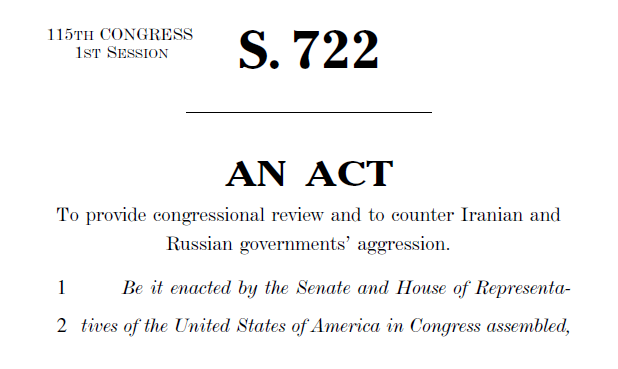
The Anglo-American business media have reported the bill as an escalation in US economic sanctions against Russian targets, extending beyond the oil and gas sector. The Wall Street Journal interpreted the legislation as an attempt to “wrest more control of Russia policy from the Trump administration”. The Financial Times reported the bill would “tighten existing sanctions and threatens to broaden the restrictions from energy and banking to metals, mining, railways and shipping.”
The newspaper failed to read the small print, noticing few of the novel details, except for one — the bill’s threat to strike at European companies engaged in building and operating the new Russian gas pipeline to Germany, Nord Stream II. According to Section 232, the US will prohibit a company from “mak[ing] an investment described in subsection (b) or sells, leases, or provides to the Russian Federation, for the construction of Russian energy export pipelines, goods, services, technology, information, or support described in subsection (c)— (1) any of which has a fair market value of $1,000,000 or more; or (2) that, during a 12-month period, have an aggregate fair market value of $5,000,000 or more.”
In practice, as the text of the bill continues, this is aimed at all Russian exports of energy, including pipelines under the Black Sea and in the Far East, and tanker shipping, particularly the oil and gas tanker company, Sovcomflot. Privatization of part of the state shareholding in Sovcomflot, which has been postponed for years, has been promised by federal property agency officials for later this month.
However, the Senate bill threatens to sanction any company, US or other, which makes an investment of up to $10 million “if the investment directly and significantly contributes to the ability of the Russian Federation to privatize state-owned assets in a manner that unjustly benefits— (1) officials of the Government of the Russian Federation; or (2) close associates or family members of those officials.” That puts the kybosh on Gennady Timchenko, front-runner for the Sovcomflot share sale, and father-in-law of Gleb Frank, son of the chief executive of Sovcomflot, Sergei Frank. For background, read this.
But the Senate bill goes much further than attacking foreign investment in share sales for Russian state companies. It attacks the shareholding control of most of the country’s resource assets – that’s to say, the oligarchs. Section 241 of the new bill is entitled “Report on Oligarchs and Parastatal Entities of the Russian Federation.” Read carefully.
“(a) In general.—Not later than 180 days after the date of the enactment of this Act, the Secretary of the Treasury, in consultation with the Director of National Intelligence and the Secretary of State, shall submit to the appropriate congressional committees a detailed report on the following:
(1) Senior foreign political figures and oligarchs in the Russian Federation, including the following:
(A) An identification of the most significant senior foreign political figures and oligarchs in the Russian Federation, as determined by their closeness to the Russian regime and their net worth.
(B) An assessment of the relationship between individuals identified under subparagraph (A) and President Vladimir Putin or other members of the Russian ruling elite.
(C) An identification of any indices of corruption with respect to those individuals.
(D) The estimated net worth and known sources of income of those individuals and their family members (including spouses, children, parents, and siblings), including assets, investments, other business interests, and relevant beneficial ownership information.
(E) An identification of the non-Russian business affiliations of those individuals.
(2) Russian parastatal entities, including an assessment of the following:
(A) The emergence of Russian parastatal entities and their role in the economy of the Russian Federation.
(B) The leadership structures and beneficial ownership of those entities.
(C) The scope of the non-Russian business affiliations of those entities.”
(3) The exposure of key economic sectors of the United States to Russian politically exposed persons and parastatal entities, including, at a minimum, the banking, securities, insurance, and real estate sectors.
(4) The likely effects of imposing debt and equity restrictions on Russian parastatal entities, as well as the anticipated effects of adding Russian parastatal entities to the list of specially designated nationals and blocked persons maintained by the Office of Foreign Assets Control of the Department of the Treasury.
(5) The potential impacts of imposing secondary sanctions with respect to Russian oligarchs, Russian state-owned enterprises, and Russian parastatal entities, including impacts on the entities themselves and on the economy of the Russian Federation, as well as on the economies of the United States and allies of the United States.”
The senators voted in favour without deciding on a definition of Russian oligarch, corruption, “closeness to the regime”, “relationship to President Vladimir Putin or other members of the Russian ruling elite”, or “parastatal”. Still, the meaning and intention are as clear as the US Air Force’s MOP (Massive Ordnance Penetrator) – the bunker buster.
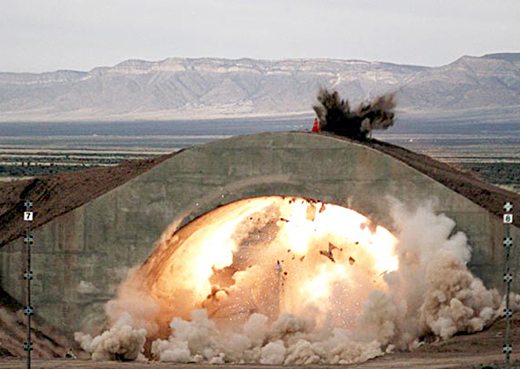
The targeting of Section 241 includes almost every major Russian corporation, its control shareholders, associated banks, and their offshore businesses. The stated aim is nothing less than to destroy those of them who side with the Kremlin; recruit the remainder for US-backed regime change; and pit each against the other, all against the Kremlin.
Selective oligarch targeting is already in effect; click to open for the current list. Timchenko has been sanctioned by the US and the European Union since 2014. Other oligarchs also proscribed include Sergei Chemezov, head of the state asset holding, Russian Technologies (Rostec); Yury Kovalchuk of Bank Rossiya; Boris and Arkady Rotenberg, who control SMP Bank plus pipeline and infrastructure businesses, and Roman Rotenberg, Boris’s son; Igor Sechin, chief executive of Rosneft; Nikolai Shamalov, also of Bank Rossiya and father of Kirill Shamalov, Putin’s son-in-law; and Vladimir Yakunin, former head of state-owned Russian Railways.
The Christmas dinner which Putin has hosted each year since the war started in Ukraine identifies by name four dozen potential targets in the latest act of US war. Read the guest list for 2014; for 2015; and for 2016.
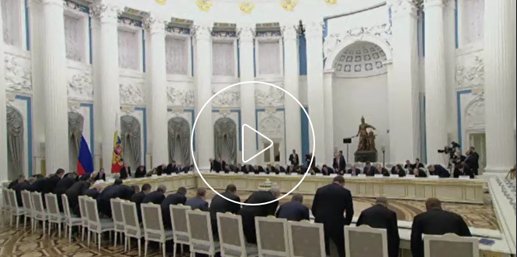
The pre-dinner speech-making session at the Kremlin oligarch dinner, December 19, 2016. Source: http://johnhelmer.net/oligarchs-on-the-skids-president-putin-goes-down-market-for-capital-reception-next-year-labour-union-bosses/
Missing from the official sanctions lists so far, but with substantial US assets, are Anatoly Chubais, head of the state high-technology holding Rusnano; Mikhail Abyzov, financial backer of Prime Minister Dmitry Medvedev and minister of open government in his cabinet; and Mikhail Fridman of the Alfa Bank, LetterOne and Vimpelcom groups. Vimpelcom has been prosecuted for corruption by the US Department of Justice and fined $397.6 million, the ninth largest such penalty in US history. More recently, Alfa was targeted for allegedly operating clandestine connections with the Trump presidential campaign.
Two of the oligarchs with valuable residential assets in New York, and solid relationships with Putin, are Oleg Deripaska (lead image), who controls the state aluminium monopoly Rusal; and Roman Abramovich, the control shareholder of the Evraz steel group, which runs steel and pipemills in the US and Canada. Deripaska owns at least two homes in Manhattan, but is prevented from living there by a longstanding US visa ban which his Washington lobbyist has been unable to remove. For Deripaska’s New York assets, read this ruling of April 25, 2017, by New York Supreme Court Judge Anil Singh.
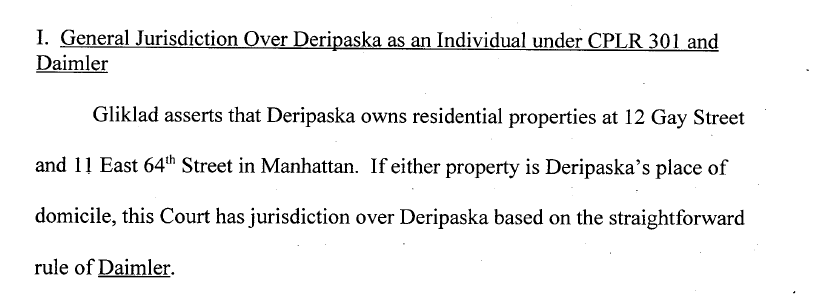
Source: https://iapps.courts.state.ny.us/fbem/DocumentDisplayServlet?documentId=pFEUA7VGZSJVzEDl_PLUS_NHiTg==&system=prod An unredacted version of the text of the order can be read here. This reveals that Deripaska continues to be targeted by a US visa ban. One of the redactions Deripaska lawyers have obtained in the court docket reads: “Deripaska emphasizes that his access to New York is blocked because of a visa problem. Although he has been able to enter New York on a diplomatic visa, his visits to New York since 2009 have been limited to ten trips for a total of less than 30 nights. When he was directed by the court to make an effort to attend a trial as a witness in a case in New York in the Fall of2015, he applied for a visa, but his request was denied.”
To view Abramovich’s homes on East 75th Street, Manhattan, click to open.
Another way to anticipate who will be informally targeted by the US shortly — formally later — is to look at the concentration of Russian wealth, and identify Russia’s ultra high net worth individuals, the multi-millionaires. By world standards, the Russian count is in the top-20, but trails far behind the US, China, and several European and Pacific Rim countries.
But when the count is of billionaires and of concentration of national assets in their hands, Russia leads. In its latest Global Wealth Report for 2016, Credit Suisse reports: “According to our estimates, the top decile of wealth-holders owns 89% of all household wealth in Russia. This is significantly higher than any other major economic power: the corresponding figure is 78% for the United States, for example, and 73% for China. The high concentration of wealth in Russia is reflected in the fact that it has an estimated 96 billionaires – a total exceeded only by China with 244, and the USA with 582.”
The combined impact of war, sanctions, devaluation of the rouble, and the collapse of oil and other commodity prices, has been to diminish the value of most classes of Russian assets. Wealth for everyone below the millionaire level has been dwindling because home values have fallen, along with income, while debt has risen in absolute and proportional terms. According to the Credit Suisse report, “we estimate that [debt] now equals 16% of gross assets – up from 12% two years ago.”
“Household wealth in Russia grew rapidly in the initial years of this century, as the country boomed along with global commodity markets. Between 2000 and 2007, wealth per adult rose eightfold. Since 2007, however, growth has been slow and uneven – up 14% to date in ruble terms, but down 56% when measured in current USD, due to ruble depreciation. The USD–RUB rate rose from 25 in 2007 to 34 in mid-2014, and then shot up to 60 by the end of 2014 due to the imposition of financial sanctions. The rate was 64 in mid-2016. While household wealth per adult has risen from USD 2,940 in 2000 to USD 10,340 today, the current level is barely above that of ten years ago.”
A new study on inequality in Russia, published in February by the Analytical Centre of the Russian Government, confirms that the impacts on income, assets, and net wealth have been bad for the middle class of Russian income earners, and disastrous for the Russian poor. The divide between rich and poor has been getting worse, according to this English summary.
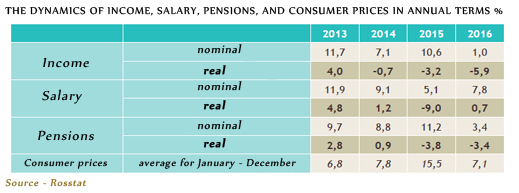
Source: http://ac.gov.ru/files/publication/a/11944.pdf -- page 5.
So it is now the calculation of the US Senate, to be followed by the Congress and likely by the President, that Putin’s greatest vulnerability in the present situation is not simply cronies like Timchenko, Kovalchuk or the Rotenbergs, but the inequality of the entire Russian oligarchical system.
In the past, there was a brief attempt by the US intelligence services to target some of the oligarchs. In 2010, when Admiral Dennis Blair was Director of National Intelligence (DNI), his annual threat assessment for the US Senate Intelligence Committee reported “[there is] a growing nexus in Russian and Eurasian states among government, organized crime, intelligence services, and big business figures. An increasing risk from Russian organized crime is that criminals and criminally linked oligarchs will enhance the ability of state or state-allied actors to undermine competition in gas, oil, aluminum, and precious metals markets.” Implied but unnamed were Alexei Miller (Gazprom), Deripaska (aluminium), and Suleiman Kerimov (gold).
A year later, Blair’s successor as DNI, Lieutenant-General James Clapper, repeated the line: “The nexus in Russian and Eurasian states among some government officials, organized crime, intelligence services, and big business figures enhances the ability of state or state-allied actors to undermine competition in gas, oil, aluminum, and precious metals markets.” Read more.
The DNI annual reports were no more than that – no action was recommended, and none followed.
S.722 goes much further, codifying the existing Russian sanctions in statute which the White House cannot relieve by presidential decree; imposing new sanctions the same way; and setting up a scheme of reporting of new targets. By itself, the report process will immediately trigger informal sanctions, with or without the formal orders to follow.
In this new Senate bill, the targeting is no longer crimes committed, or even the restraint of competition, but Russian wealth itself, and the oligarchs who have most of it. That is revolutionary. So is the exception in Section 241(a)(1)(A) for “their closeness to the Russian regime”. That’s a call for the oligarchs to join Mikhail Khodorkovsky in open rebellion.
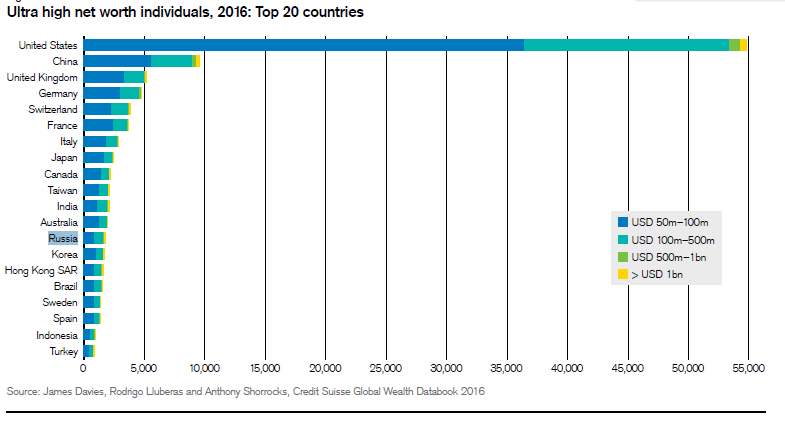


Hell, if the DNI can do this for the Russians, imagine what we could do for America!!!!
Trump veto, I suspect. For “Fake News” reasons. Doubt an over-ride. Let’s get this over with, and move onto common sense. American legislators are clueless as always, but the blob remains on the attack.
It passed the Senate 98-2, I don’t know why you doubt an over ride. Do you think 32 Senators will change their mind or that it won’t get 2/3 of the House?
The Bill effectively requires Europe to shoot themselves in the other foot or cease using USD for exchange in Russian trade.
Europe’s problem will be Poland where fear and trembling of Russia finds its European root. The Polish Government would choose poverty before Russian trade and the country has worked assiduously to build connections and friendships in the EC and parliament. In fact Poland has been America’s ‘foot in the door’ in Europe and the first shipment of US fracked gas has already been received in that country.
If America can quickly build the LNG carriers needed for the trade there may be a prospect of keeping US fracking alive whilst diminishing Russian trade but this is contrary to European interests at a time when the neocon influence in Washington is driving many former friends away.
I read an article recently explaining the mechanics of how the US could supply LNG to Europe but can’t remember where. In short, the article says not gunna happen. You would need to build a brand new FLEET of LNG carriers that don’t exist yet and would take a decade to build. Who is going to finance that epic cost? You would also need to rebuild several ports as well to take such a fleet and find the money to build it. You would need several LNG carriers arriving daily (!!) to fill the gas needs of Europe.
The US LNG is much more expensive than the Russian ones so Europe would have to cut their budgets to pay for the damn stuff (but the US would demand that the cuts not come from the NATO budget). I’m not going to mention what would happen if one of those carriers had an accident in port and blew up but the word Hiroshima comes to mind. To top it off, Russia has proven to be a reliable business partner but if you are depending on the US for your LNG gas supplies, well, good luck with that. These days the US tends to regard contracts and treaties as aspirational documents only. Sorry, but that is how the record reads.
Yep. I very much agree with your analysis. Is the US interested on a widening rift with continental Europe?
Thanks for that common sense comment. I do not know what these clowns are smoking but they need to change their brand of mushrooms.
Just from an economic point of view, as you note, which would be more cost effective, gas by pipe or gas by carrier over the atlantic, ignoring the sunk costs and time of building the carriers-hint, gas by pipe.
Yes. The current strategy of “keep adding crackpot countries to NATO and the EU” really should stop before it ends in disaster. A Disaster compared to which the dissolution of the EU and hard-right nationalists seizing power all over the board are mere setbacks and inconveniences.
Americas goal is to destroy any competition to the US, whether in thought, expression, beliefs, spirit, music, art, farming, government or business. There can be only One and that One must be America! (The Saudi Wahhabis believe in the same thing, BTW, apart from the “America” part).
One cannot enter into a contract with the US because it will not honoured, it is merely a booby-trap that will be set off when the damage will be the greatest. We are un-american, therfore un-people to be used for a time, then betrayed and discarded just like Saddam was.
It is well about time that the EU grows a pair and start serving the interests of the EU population. I fear that Merkel and Macron will blow it, as missing the obvious is their nature / job, and then the doors will open for the other people.
Spot on.
Sikorski (Appelbaum’s husband) was a big player in the Ukrainian EU association agreement that precipitated Maidan.
But methinks the Blob has overreached with this pan – assault on Russia, not least because of the interconnected and intertwined Russian – EU gas companies.
The Nordsteam is going ahead, the Turkish likewise, and China has made the last lap in its gas corridor to the Med.
Germany is pretty mad right now, and working assiduously to woo post – sanctions Iran.
If the previous doubling-down drove Russia and China into each others geopolitical arms, it seems unlikely Germany won’t follow suit – NATO occupied or not.
Frankly, the Baltics and Poland are pretty poor consolation prizes, especially now that the Ukraine fiasco had cost it Crimea (eg Sevastopol and with it, control over the Black Sea. . So much for plans to turn it into a ‘NATO lake.’)
Oligarchs will now be forced into compromise with the Kremlin, with their overseas power so severely constrained.
I can imagine someone is smiling, somewhere..
Eh, Germany doesn’t really do “mad” (not since WW2, anyway). Ultimately, realpolitik is still very much a thing in Germany. The problems run deeper.
Recall that Angela Merkel has been one of the strongest supporters of sanctions against Russia in the EU, even where it was not necessarily in Germany’s short term economic interests. If the US were to unilaterally impose sanctions that not only hurt Russian, but also German interests, that would undermine her domestically and make it harder for her to continue supporting sanctions.
The problem here is less Nord Stream 2. Granted, the German government is unhappy with the sanctions insofar as they target Nord Stream 2, but Germany has traditionally valued its partnership with America too much for a solution to that issue to be impossible, if approached the right way. Multilateralism is part and parcel of Germany’s constitutional DNA as far as international relations are concerned, so you can generally convince them to do something for the greater good of all involved (up to a point), especially if a compromise can be negotiated.
The bigger problem from the German perspective is the “America first” rhetoric surrounding the bill and the lack of consultation of America’s European partners. There is no clear attempt at a multilateral approach here, just an apparent attempt by America to go it alone and serve its own interests, as far as many German politicians are concerned.
Details matter, too. For example, you can make good arguments against Nord Stream 2 regardless of sanctions (you’ll find plenty of critics of the project within the EU). But from the European perspective, there’s also the suspicion that at least part of the reason for targeting Nord Stream 2 is to remove competition for American gas exports. So, if you want to sell that to the EU, you have to convince them that clandestinely serving American interests is not the actual goal.
Germany is only interested in markets for its trade surplus.
Makes much more sense for it to turn East – towards China, where there is a better market for its goods (and no Trump threatening tariffs).
Then there’s Russian gas – cheap and accessible , as opposed to US LNG – expensive and transport – problematic.
Not to mention non – GMO agricultural products (Germany really does not want this stuff poisoning the entire food chain as in US.)
With Britain out of the EU, US has lost quite a bit of its lobbying influence.
So I don’t think you’re reading the situation accurately at all.
Remains to be seen whether Germany grabs this chance or not, but the desire is certainly there.
And now The Koreans Have Launched An ICBM That Could Reach Sarah Palin’s Porch In Alaska OMELG!!! Except the Chinese and Russians say it was only an IRBM!!!! And the Pentagram is gearing up for another “stop the WMDS how dare you not kowtow to Uncle Sam exercise!!!!”
And even my unpolitical spouse, who nonetheless grew up ducking and covering under her grade school desk, is feeling the queasy willies, and asking anxious questions, about nuclear weapons and what is going on, that I have to craft careful answers to.
Forking rotten stupid humans. Could and have screwed up a pretty lovely planet…
On a local note, our “neighbors” are putting on what sounds like the start of the Tet offensive, fireworks and some gunfire, and the local cops in response to a phone call said they are not going out this national holiday celebration to enforce the law against what some Americans think of as “celebration.” My dogs are going nuts from the explosions, and bits of smoldering guts from the skyrockets and “mortar-launched display shells and aerial bombs” are drifting down on our roof and cars and garden and the shade cloth we’ve stretched over the patio.
At least in Vietnam I could shoot back…
same here in New Mexico, where the temp is around 100F and humidity is 15%. and oh, it hasn’t rained in about 45 days. I called the cops twice tonite on the ICBM’s the neighbors have lit in their yards.
New Mexico holds dear the Second and a Half Amendment: the right to bear explosives and to set ’em off.
Here in Tucson, the neighborhood pyrotechnics team launched an impressive display. Fortunately, it ended at 10 pm and then we had a silent night.
Oligarchs should be targeted by the law. Few acquired their billions ethically, fairly, or as a result of activities that are useful to humanity in general. Here are some more oligarchs who should be targeted:
United States only: https://www.forbes.com/forbes-400/list/#version:realtime
Entire world: https://www.forbes.com/billionaires/list/#version:realtime
What about their football or basketball teams, or soccer clubs?
“…to counter Iranian and Russian governments’ aggression.”
reminds me a bit about a UK news headline earlier this year, running along the lines of: “In order to thwart Russian aggression, we’re sending UK soldiers to their border” … a border 2,000+ km from the UK
We have to be more aggressive than they are in order to make them less aggressive. Are they less aggressive because we’re more aggressive, or are they less aggressive because our aggression will make them more passive? The US Congress gotta know.
And when will the US Congress write a bill to support the American people against their own aggressive Oligarchs?
I understand our oligarchs don’t like their oligarchs.
Ding-Ding!!!
On a related note, let’s say we eliminate the oligarchs in Russia. It just means somebody else in Russia will be hoovering up all the surplus that’s available there. What do you call those winners if they’re not oligarchs? Corporations and banks with better PR?
More importantly, somebody that the US can do business with? Like the winners there when Russia was being led by Yeltsin?
Trump: My oligarchs are gonna kick your oligarchs asses! Winning
Foot soldiers=>smart bombs=>drones=>oligarchs?
Since when, exactly, has the US been “a foreign state at war with Russia”?
Exactly when did that declaration of war pass Congress?
Or did Russia declare war on us?
This is some pretty sloppy phrasing for a “professor of political scientist”.
You’re, of course, correct: there is no state of war between the US & Russia.
However, assume this legislation actually became law — it would be the most blatant defacto declaration of war in a long time. In that sense it IS a revolutionary act (& also an act of unparalleled psychotic hubris)
How do you become an oligarch? Is there a form to fill in?
Yeah, the form for buying up state industries for cheap when they were being privatized.
High and mighty heavy-handedness from the usual suspects here. To think, all of this – ALL OF IT – borne out of the desire to spare Clinton blushes post election.
#WhatATimeToBeAlive
Winter is coming. We’ll see what our Western European allies have to say about US dictates on how they should go about securing their energy needs.
Of course the house of Suad who claim all the oil in Saudia Arabia belongs to their family are not oligarchs and fully supported and we are quite happy for them to chop off the heads of any dissidents or rain down bombs on any neighbour who supports a different strain of islam.
I am sure that somewhere in the “The Identity Politics Practical Application Handbook” the relative victimhood of the Saudis are found to be much higher than the Yemenites which makes everything they do to Yemen “A justified reaction to white racism, discrimination and imperialism”.
Following the I.P.P.A.-Rules, the only possible Progressive response will be something like: “OK, we are so sorry that you were forced to do this terrible thing. It is all our fault. What can we do to make it right?”
Obviously, “She Who Must Not be Named” will add a “That will be a donation of 20 million US, Thanks!”-clause to the Progressive message before sending it on. But, that’s OK too “Because VICTIMHOOD Rulez”, “Biatch”!
What is the net worth of senators signing the agreement?
Looks like the only two votes against were Rand Paul and Sanders. Since the Russia hysteria seems to be easing up a bit it would be interesting to know whether this really does have a chance of passage. After all making oligarchs the pawns in an ideological war could threaten some powerful people and not just in Russia.
Is the rest of the Senate trying to shakedown Russian oligarchs for campaign contributions? /snark
While per above Russia appears to have even greater wealth inequality than the US perhaps the difference is that here the oligarchs totally control the government whereas in Russia –with memories of the Yeltsin era–they do not. So if Russian oligarchs lack the power to remove a leader with an 80 percent approval rating then it’s hard to see how this declaration of economic war will have any greater political effect than previous sanctions. Plus the bill threatens Europe’s gas supply. Reportedly they are not pleased.
Therefore one suspects that this is just grandstanding and also that so-called liberal Democrats such as Elizabeth Warren are shameful for supporting a looney bill coming from Corker of Tennessee.
At any rate should be interesting to see what happens.
This legislation sure sounds like a precursor to a declaration of war. What kind of sanctions are to be imposed on offending international banks, oil service companies, etc., if this bill becomes law?
I’d be very interested to learn of reactions to this from the Chinese elite/state. China is in a much more powerful position economically than Russia but, regardless, my hunch is that they might anticipate the same being done to them in nominal reprisal for “aggression” in the South China Sea or somesuch.
Putin’s ratings are high, his foreign policy is working, and I’d guess the military is behind him. At this point an oligarch coup is a fantasy. They’ll eat the losses and wait it out, and among them I wouldn’t want to be known as one of America’s favorite Russian oligarchs.
If you want to reduce the worlds population nuclear war is the best way to get it done quickly ! This is a very stupid act?